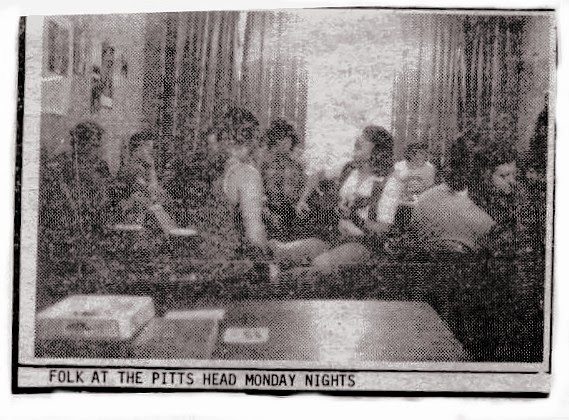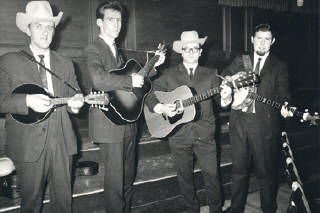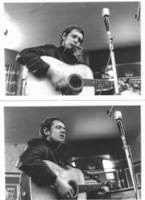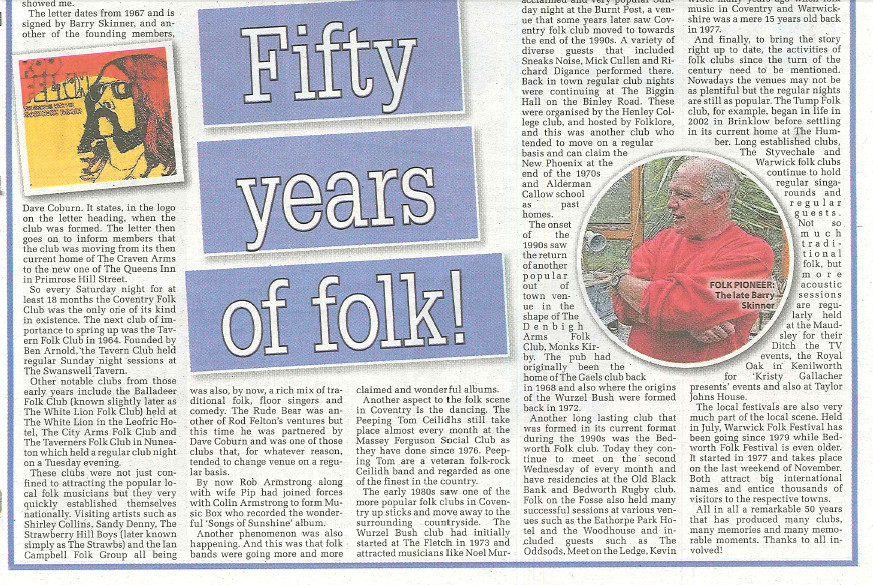This post, like many on here was originally the Hobo Vox blog 09/17/2008 and then archived on Typepad when that blog shut down. It’s now on here! Dave Turner was from Nottingham but had close associations with the Coventry folk scene…Thanks to Carol Dickens some of the material here.
Tribute to Folk-Comedian Dave Turner – The original British comedy folk performer
“Now Maggie Thatcher tells me
You gotta make some money
If you want to live in this land of milk and honey
But honey dried up
and the milk’s gone sour
It’s very hard to make the bread without the flour
Sometime I wonder what I’m a gonna do
Cos there’s only one wheel on my wheelie bin blues.”
To the Tune of Eddie Cochran’s – Summertime Blues
By Dave Turner (From his My Space – http://www.myspace.com/daveturnernottingham
Influential folk comedian Dave Turner, author of many hilarious clawpicked satirical songs, passed away at
66 early in September 2008. “He was the original British comedy folk performer,” says brother Pete Turner. Although Dave was from Nottingham, not Coventry, Dave had associations with the Coventry folk circuit and was a friend of Coventry’s top folk artist and guitar maker -Rob Armstrong (known for his own comedy song via The Modern Idiot Grunt Band – duo with Rod Felton in the 70’s. This a small tribute to man and his music and I do recommend you have a listen to some of Dave Turner’s songs on the new My Space site – they are very well performed and hilarious!
As didn’t know Dave personally, the material in this tribute has come from his partner – Carol Dickens and from his My Space site, but having listened to his songs on My Space, this is the passing of a very special comedy and folk talent who will be well known to many Coventry folkies.
FROM THE DAVE TURNER MY SPACE
TRIBUTES have been paid to a pioneer of the comedy folk scene.
Dave Turner, who died at the weekend aged 66, influenced the likes of Billy Connolly, Jasper Carrott
and Mike Harding during the 60s and 70s as one of the first folk musicians to introduce comedy into his live shows.
“There will be a bit of Dave that will carry on forever,” says folk singer Fred Wedlock, the man behind the 1981 hit The Oldest Swinger In Town.
“They’ll sing his songs forever and even if they don’t sing his songs people will be listening to singers who were influenced by Dave. People like Jasper Carrot, Mike Harding and Billy Connolly. And myself.”
Wedlock, who recorded two of his songs – The British Bobby and Robin Hood – met him in the mid-70s on the folk circuit. Click here!
“He stayed with me when he played in Bristol and I’d stay at his flat above a launderette in Hyson Green when I played in Nottingham.”
He adds: “He wrote some very funny songs and he was a lovely, friendly, generous, gentle bloke. And a bit of a hippy, really.”
Friends and contemporaries also included Jake Thackray, John Renbourn and Bert Jansch.
“He was the original British comedy folk performer,” says brother Pete Turner.
Dave Turner was born in The Meadows and lived in Canada from the age of 10 -15. He worked as a miner for a number of years at Wollaton Colliery.
“He wrote songs down there,” says Pete.
“I remember one about a pit pony that he looked after that he thought was being mistreated.
“But that was more of his serious ones. He was better known for his comedy songs.
“He started doing comedy folk on stage after listening to a record by an American called Jimmy Driftwood called Very Unfortunate Man.“
He was already performing in folk clubs as part of a duet but was too nervous to go solo. During a gig at the Nottingham Folk Workshop in Heathcote Street in the early 60s, his musical partner left the stage.
“He said ‘and now Dave will do a few solo songs’. He was bricking it,” laughs Pete.
“But he did Very Unfortunate Man and everyone loved it. That was it.”
As well as being a regular on the local circuit, Dave would tour the UK’s folk clubs, playing the same clubs as Connolly, Harding and Carrott.
He also appeared on a bill with Tom Jones.
“Jasper Carrott banned him from the club he ran in Birmingham because he was too popular,” says Pete.
Dave, who suffered ill-health from the early 90s, ran the Folk, Blues & Beyond night at the Running Horse for years and would introduce acts at the Golden Fleece’s open mic night up until six years ago.
“About four years ago he contracted shingles in his right arm and, due to severe nerve damage, was unable to play the guitar again,”
And From Carol Dickens
Dave was a popular ‘folk comedian extraordinaire’ of the 60s and 70s, a friend and contemporary of Jake
Thackeray, Fred Wedlock, John Renbourn, Bert Jansch, Anne Briggs, Billy Connelly and many more.
He supported some major bands of his era, including ‘Spirit’ and ‘the Crazy World of Arthur Brown‘. A brilliant self-taught guitarist and artist, he influenced many other musicians.
Later he ran ‘folk, blues and beyond’ at the Running Horse and at the Golden Fleece. He was still introducing acts at the ‘Fleece’ open mic night up until about 6 years ago. Sadly about 4 years ago he contracted shingles in his right arm and ,due to severe nerve damage, was unable to play the guitar again.
If anyone has any ‘Dave Turner‘ stories to tell or photographs to show you can contact us on here and we’ll pass a message on to Carol or you can leave a comment below.
41 mins of live Dave Turner
Comments

I knew Dave very well when we lived in Nottingham back in the late ’60s. I tried a few years back to get in contact with Dave but I couldn’t find any way to get hold of him, and now that I have just found this site I am really sad that he is no longer with us, and that I never will. I have many lovely memories of Dave, and a great deal of material about him including live recordings that I made of some of his performances. I will be most happy to expand on all this if Carol or anyone else who is interested would like to get in touch with me at peter@eastdevonfolk.org
Posted by: PeteJurassic | 01/07/2012 at 05:15 PM














